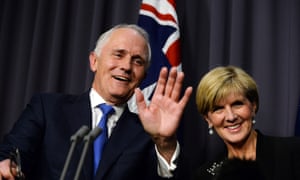Extract from The Guardian
The millionaire former banker holds off from
policy pronouncements, but says he will respect traditional cabinet
processes and the intelligence of the electorate
Malcolm Turnbull and Julie Bishop speak to media
after winning the leadership. Photograph: Sam Mooy/AAP
Tuesday 15 September 2015 00.22 AEST
Malcolm
Turnbull has promised a new prime ministerial style respecting
the intelligence of the Australian electorate and explaining
necessary policy changes after winning the Liberal leadership from
Tony Abbott in a party room ballot by 54 votes to 44.
But Turnbull said the substance of the Coalition’s
climate change policy and its pledge to hold a national plebiscite on
marriage equality would not change. He declined to nominate policies
that would be altered without first consulting colleagues because he
was determined to restore a “thoroughly traditional cabinet
government”.
His immediate pledges, ahead of being sworn in as
Australia’s 29th prime minister, are in direct response to the most
strident criticisms of Abbott – that he governed by three-word
slogans rather than thought-through policies and bypassed or ignored
his cabinet on important decisions.
Turnbull also addressed the criticisms of the
Liberal party’s conservative wing who overthrew him as opposition
leader in 2009 in favour of Abbott because of Turnbull’s backing
for the then Labor government’s emissions trading scheme. The
rightwing insist the millionaire former merchant banker is too
moderate for the party’s traditional base.
Malcolm Turnbull speaking to media after the
ballot.
“The Liberal
party is the largest, most diverse grassroots political
organisation in Australia. Our party room is remarkably diverse both
in terms of people’s life experience, their former occupations and
their views on many issues. This is why a culture of engagement, of
consultation, of collaboration is so absolutely critical,” Turnbull
said at a press conference after the late night ballot.
Julie
Bishop remains deputy Liberal leader and will remain as foreign
minister, but a ministerial shakeup looms after the leadership
upheaval. Turnbull declined to nominate who would serve as his
treasurer, although social services minister Scott Morrison was
tipped. He will also have to renegotiate the agreement with his
national party coalition partners.
Turnbull paid tribute to Abbott, whose relentless
attacks defeated a resurrected Kevin Rudd at the 2013 general
election. But Abbott’s style did not translate well to governing.
His first budget was judged harshly for inflicting spending cuts that
hit the poor the hardest, and for breaking numerous promises made
during the election campaign.
A backbench revolt saw an unsuccessful vote to
declare the leadership vacant in February, but party dissatisfaction
never really subsided.
Long-simmering leadership tensions exploded on
Monday when Turnbull declared a challenge, arguing Abbott had shown
himself unable to make the case for policy change or turn around the
Coalition’s political fortunes.
Abbott pleaded with his party not to repeat the
Labor party’s mistakes, and his backers immediately mobilised a
counteroffensive, seeking to build momentum during the five hours
between Turnbull’s declaration and the ballot.
They insisted electorate offices were being
“swamped” with calls from Liberal members aghast that the party
would consider removing a sitting prime minister and providing a
parade of ministers to urge the party to stick with the current prime
minister.
Cabinet ministers who publicly declared their
support for Abbott before the party room meeting included Eric Abetz,
Kevin Andrews, Joe Hockey, Mathias Cormann and Peter Dutton. At least
some are now expected to return to the backbench.
Morrison said in a statement that he was “voting
for the prime minister and not standing in any ballots”, scotching
earlier claims that he could be a contender for deputy. But he did
not appear in public to argue against a change.
The decision comes two years after Abbott led the
Coalition to an election victory and seven months after Abbott’s
“near
death experience” in the last attempted leadership spill. The
Coalition has been lagging behind Labor in major published opinion
polls since last year, when the government’s first budget carried
unpopular measures to cut health and education spending, deregulate
university fees and introduce a Medicare co-payment.
In February, Abbott pleaded with his colleagues
for more time to turn around the government’s fortunes when he
faced a leadership spill motion initiated by backbench MPs. On that
occasion, there was no declared challenger, but 39 Liberals still
voted to declare the leadership positions vacant, while 61 backed
Abbott.
Turnbull visited the prime minister shortly after
question time on Monday and asked him to call a Liberal party room
meeting for a leadership ballot.
Bishop had already told Abbott – in a
pre-question time meeting – that he should stand aside. At that
point Abbott is understood to have been strongly resisting the idea
of a challenge.
Turnbull resigned from cabinet and sought support
from colleagues by pitching himself as the right person to lead
Australia at a time of major economic challenges. He
accused the prime minister of being unable to provide the
necessary economic leadership, urged colleagues to support a new
“style of leadership that respects the people’s intelligence”
instead of sloganeering, and promised to restore traditional cabinet
government.
Abbott had declared that he would fight the
leadership challenge because Australia needed “strong and stable
government” and the prime ministership was “not a prize or a
plaything to be demanded”.
“I will be a candidate and I expect to win,”
Abbott
said before the meeting.

No comments:
Post a Comment